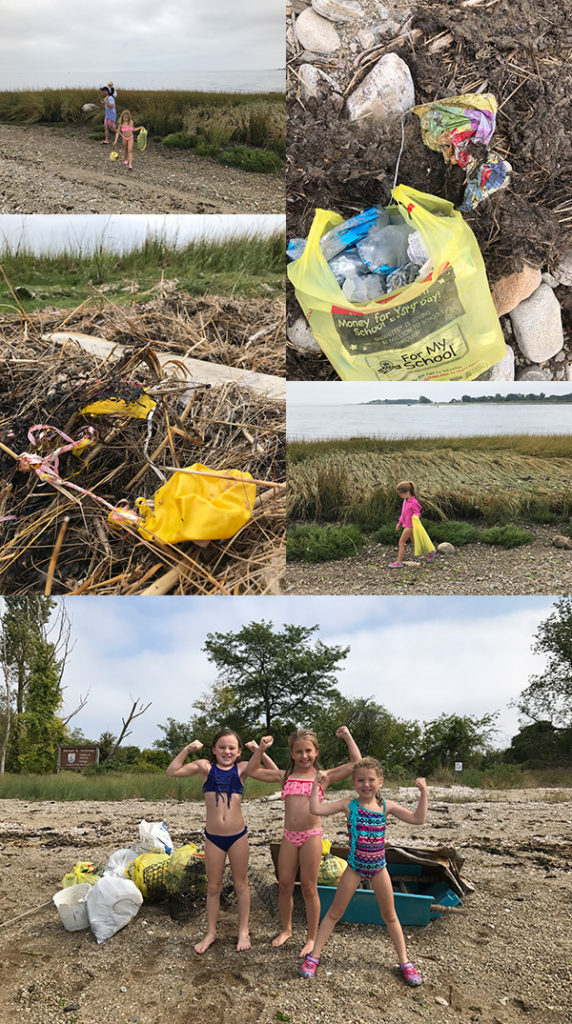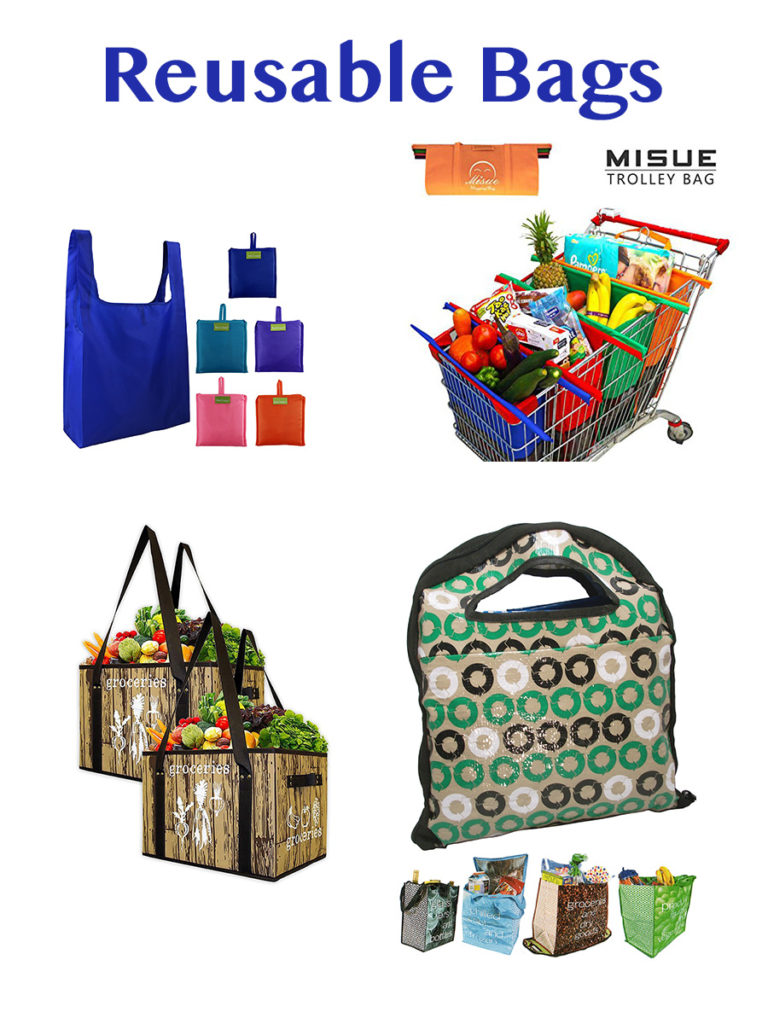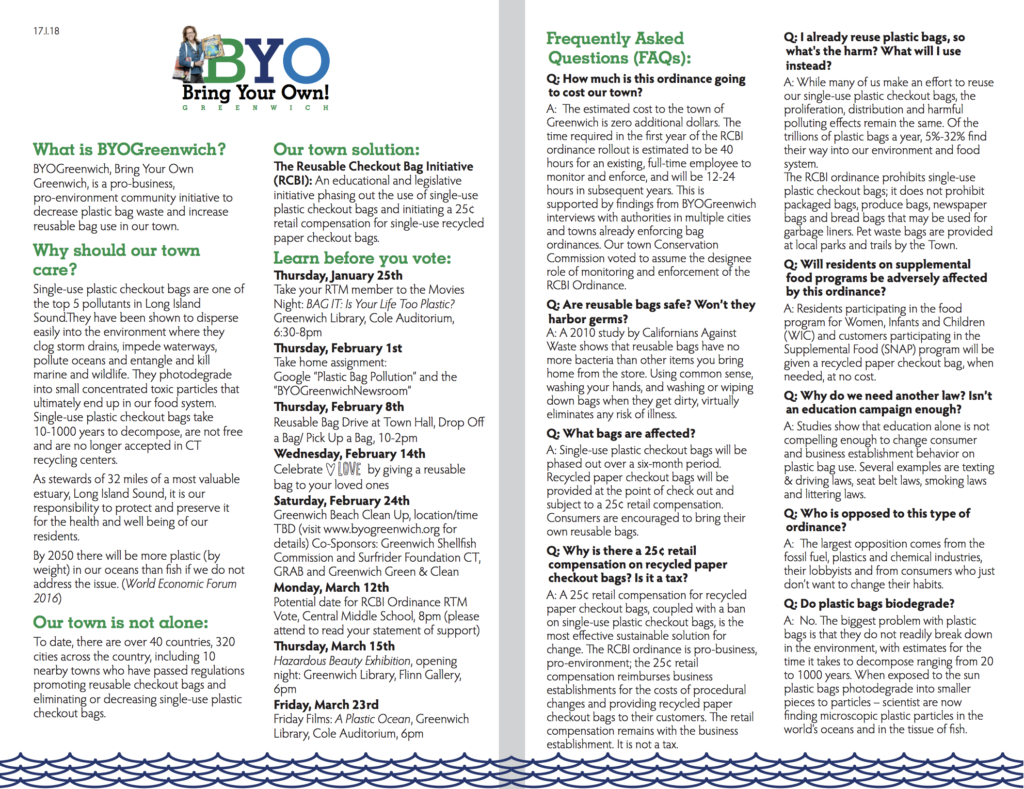
Last year, my father invited me and my family to participate in a beach clean up off the coast of Norwalk. Within two hours we had amassed a huge pile of junk to be removed from the beach. A few of the odd things that washed up on shore were a toilet seat cover, one large wooden chair, a huge plastic tub, twenty mylar balloons and tons of straws. The thing we sadly saw most of were plastic bags. In varying states of decay, they were tangled up on seaweed and stuck to rocks and shells. It certainly gave me a lot of food for thought about how many bags I use per year at the grocery store and where they end up. I was thrilled to hear that a group of residents in our town are trying to reduce the amount of plastic making its way into our landfills and waterways.
Today I proudly stand behind BYOGreenwich, a non-profit organziation trying to shed light on the harm done to our world by the over-consumption of plastic bags. BYOGreenwich, stands for ‘Bring Your Own”. The goal of this organization is to introduce an ordinance that will facilitate a change in consumer behavior by incentivizing residents to bring their own reusable bags when they go shopping. This effort’s intent is to minimize environmental damage caused by plastic bag pollution. We realize that a lot of hard work goes into the decision making process of the RTM so during the upcoming months we hope to provide you with enough information to persuade you to vote in favor of the Reusable Checkout Bag Initiative (RCBI) ordinance. Once you learn what plastic bags are doing to our health and our environment, it’s hard to ignore.
In Greenwich, we are stewards of 32 miles of coastline on the Long Island Sound that provide us with beauty, fishing, recreation, and economic activity. Fishermen have reported to us that they pull in over 200 pounds of junk and garbage per boat per day from our waters that do not belong in the natural environment. And part of this garbage is plastic bags.
The reality is that plastic bags…
• Disperse easily into the environment
• Clog storm drains and impede drainage
• Require nonrenewable, fossil fuels to manufacture
• Pollute oceans and entangle and kill marine life
• Degrade into smaller toxic particles that contaminate our water and soil
• Enter our food systems by being ingested by the fish and animals we eat
• Are no longer accepted in CT recycling centers
• Take 20-1000 years to decompose.
• And they are not free
It is time for Greenwich to join the 10 neighboring towns, as well as over 320 towns across the nation and the more than 40 countries around the world that have already addressed single-use plastic checkout bags.
Below is the trailer for the documentary “Bag It”. It was viewed by many in our town last week. The trailer is well worth watching and you can find out more about screening the film at their site here.
https://www.youtube.com/watch?v=MRjPkl_4lmM
And one big way to help the cause, is to bring your own bags next time you go to the store. Here are a few of my favorites!

{BeeGreen Bags, Misue Trolley Bags, Earthwise Bags, My Eco Bag System (5 in 1)}
Why should you care?
In Connecticut, approximately 950 million plastic bags are handed out to consumers
every year.
In Greenwich alone we use, conservatively, 12 million single-use plastic checkout bags
a year. The average single-use plastic bag is used for about 12 minutes and only 14%
of the bags are properly collected in order to be recycled.
Collectively as a group, BYOGreenwich has spent over 2000 hours researching and
studying the best way to address this environmental pollution.
• We have studied ordinances from around the country, we have spoken with
more than a dozen towns that have passed their own ordinances
• In July 2017, we presented our initiative to the Town Selectmen and they
unanimously voted to move this initiative forward to the RTM.
• We are working closely with RTM Legislative and Rules and Land Use
committees, the Conservation Commission, and the Town Attorney to ensure
that the ordinance is in proper legal working order.
Our proposal is simple.
The Reusable Checkout Bag Initiative ordinance proposes to phase out single-use
plastic bags and implement a 25cent retail compensation for recycled paper checkout
bags. A six month phase out will allow time for business establishments to work thru
their inventory they have in stock and educate Greenwich residents.
While we don’t have time to present all of the research and information on the issue to
you this evening, we encourage you to visit the BYOGreenwich.org website, read the
handout we are leaving behind tonight, and attend the educational events and
opportunities starting with the documentary, Bag It, that will be shown at the
Greenwich Main Library, Cole Auditorium on Thursday, January 25th.
We are in the process of forming an ordinance review subcommittee to avoid
unintended consequences and to make this a collective and healthier solution for all of
Greenwich.
Frequently Asked Questions (FAQ’s)
Q: How much is this ordinance going to cost our town?
A: The estimated cost to the town of Greenwich is zero additional dollars. The time
required in the first year of the RCBI ordinance rollout is estimated to be 40 hours for
an existing, full-time employee to monitor and enforce, and will be 12-24 hours in
subsequent years. This is supported by findings from BYOGreenwich interviews with
authorities in multiple cities and towns already enforcing bag ordinances. Our town
Conservation Commission voted to assume the designee role of monitoring and
enforcement of the RCBI Ordinance.
Q: Are reusable bags safe? Won’t they harbor germs?
A: A 2010 study by Californians Against Waste shows that reusable bags have no
more bacteria than other items you bring home from the store. Using common sense,
washing your hands, and washing or wiping down bags when they get dirty, virtually
eliminates any risk of illness.
Q: What bags are affected?
A: Single-use plastic checkout bags will be phased out over a six-month period.
Recycled paper checkout bags will be provided at the point of check out and subject
to a 25¢ retail compensation. Consumers are encouraged to bring their own reusable
bags.
Q: Why is there a 25¢ retail compensation on recycled paper checkout
bags? Is it a tax?
A: A 25¢ retail compensation for recycled paper checkout bags, coupled with a ban on
single-use plastic checkout bags, is the most effective sustainable solution for change.
The RCBI ordinance is pro-business, pro-environment; the 25¢ retail compensation
reimburses business establishments for the costs of procedural changes and providing
recycled paper checkout bags to their customers. The retail compensation remains with
the business establishment. It is not a tax.
Q: I already reuse plastic bags, so what’s the harm? What will I use
instead?
A: While many of us make an effort to reuse our single-use plastic checkout bags, the
proliferation, distribution and harmful polluting effects remain the same. Of the trillions
of plastic bags a year, 5%-32% find their way into our environment and food system.
The RCBI ordinance prohibits single-use plastic checkout bags; it does not prohibit
packaged bags, produce bags, newspaper bags and bread bags that may be used for
garbage liners. Pet waste bags are provided at local parks and trails by the Town.
Q: Will residents on supplemental food programs be adversely affected by
this ordinance?
A: Residents participating in the food program for Women, Infants and Children (WIC)
and customers participating in the Supplemental Food (SNAP) program will be given a
recycled paper checkout bag, when needed, at no cost.
Q: Why do we need another law? Isn’t an education campaign enough?
A: History has shown that education alone is not compelling enough to change
behaviors. Several examples are texting & driving laws, seat belt laws, smoking laws
and littering laws.
Q: Who is opposed to this type of ordinance?
A: The largest opposition comes from the fossil fuel, plastics and chemical industries,
their lobbyists and from consumers who just don’t want to change their habits.
Q: Do plastic bags biodegrade?
A: No. The biggest problem with plastic bags is that they do not readily break down in
the environment, with estimates for the time it takes to decompose ranging from 20 to
1000 years. When exposed to the sun plastic bags photodegrade into smaller pieces to
particles – scientist are now finding microscopic plastic particles in the world’s oceans
and in the tissue of fish.
And finally here is a link to a great article detailing the affects of plastic on our universe. And below are some local events to add to your calendar. Please join us in this effort to make our planet a cleaner place for us all to live.



Great article about an important environmental issue
good talk, Lin! I am constantly aware of the “beach flotsam” at the R.I. sea shore where we spend a couple of weeks in August. so every day, sometimes twice a day, I walk the shoreline both ways with a medium sized garbage bag with handles. When I spot something that is not supposed to be in nature, I bend over and pick it up. Its absolutely amazing and also disheartening to see the number of juice boxes and straws, plastic cigar tips, hair scrunchies and coated rubber bands, many, many deflated and now gooshy (helium) balloons with many ribbons tangled in large clumps of seaweed, cigarette butts, empty cans and various articles of clothing, diapers and so many plastic disposable lighters! This is my daily habit…to be involved with making things right. Often the little kids tag along and gleefully find things to put in the bag too. The adults usually thank me. Then I put my bag in the dumpster as I leave the beach. and know I will probably find the same kind of junk the next day. But for my time there, I have applied a small band aid.
Fantastic article! Will look for those my eco bag systems.
Love this one! Call for positive change!
Love this one! Call for positive change!
I shared this blog with Ron, who is on the Clean Energy Task Force in Fairfield. He wants to learn more about this project in Greenwich as it is extremely relevant to his committee’s mission. Please keep us informed of progress ( or resistance ).
Love you! Onward!